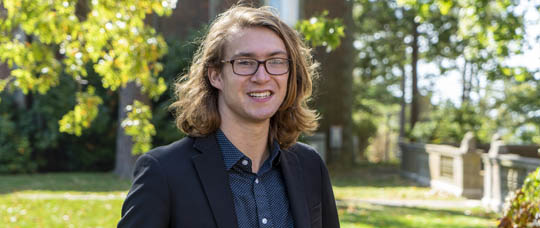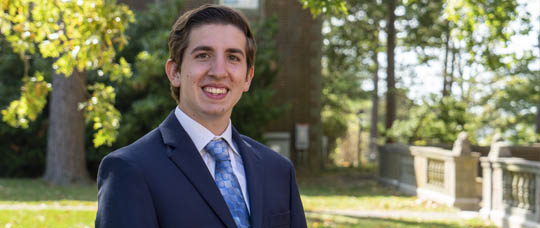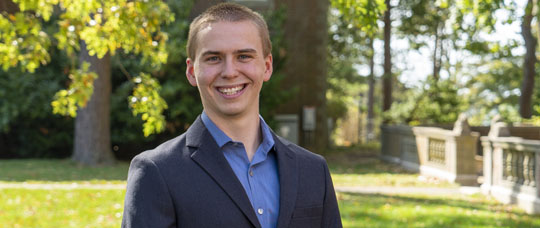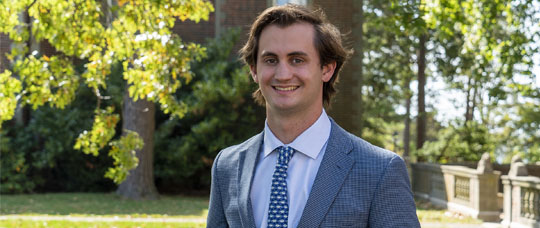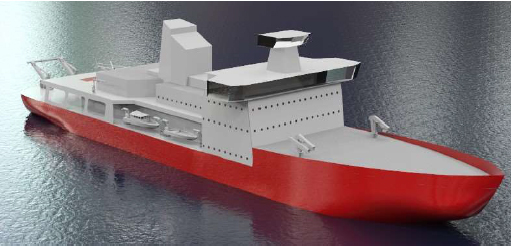Senior Spotlight: Luke Herbermann ’21
Hometown: Wakefield, RI
Thesis Title: The Viability of Compressed Natural Gas as Fuel: The Installation and Emissions Testing of a Dual-Fuel System for an Electronically-Timed, High-Speed Diesel
Post Graduate Plans: Working at Northern Shipping Funds in Stamford, CT
What was your favorite Winter Work internship?
Sea term aboard the M/V Yorktown Express.
Do you have any advice for incoming students?
Webb is truly what you make of it.
What will you miss the most about Webb?
I will miss the people of Webb.
What’s your favorite spot on campus and why?
On certain late nights, I would hang out in the auditorium and write music. This was also a place I could be alone and reflect.
What activities were you involved with at Webb?
Jazz band, Woofs, Basketball, Soccer, Tennis, and lots of shenanigans.
Senior Spotlight: Daniel Desio ’21
Hometown: Marietta, Georgia
Thesis Title: Airport Ferries: A Feasibility Analysis and Concept Design of a New York Airport Ferry
Post Graduate Plans: NSWC Carderock, Combatant Craft Division
What activities were you involved with at Webb?
Sports-Related: Soccer, Tennis, Basketball, Volleyball, Disc Golf, and Ultimate
Music Related: Jazz Band, Webbstock Band, and WooFS
Miscellaneous: Anchor Club and Wakeboarding
What will you miss the most about Webb?
I am going to miss all the late-night shenanigans while doing work, spending time with all my classmates, and the closeness of all the friends I gained. I love the sense of community and the family atmosphere and I will be sad to see it go.
Do you have any advice for incoming students?
You have more time than you think. Yes, there is a good amount of work that you have to do, but if you prioritize having fun and doing spontaneous activities with friends, the work will get done. It is okay to be a late-night crew because it’s only four years so make sure to make all the memories you can.
What’s your favorite spot on campus and why?
I really enjoy the pub because it is a great space to hang out and spend time with other classes. One of my favorite memories of hanging out in the pub was going in and talking to the seniors when they were working on SD and getting sponsored during games. I learned and honed my pool skills while at Webb too.
What has been your greatest challenge?
My greatest challenge is my fear of failure. I often second guess my decisions or base what I do on what has the highest likelihood of success. It hinders me when I choose not to do something because I am scared I might fail, so I will just do what makes me comfortable, even if it is not what might bring about the best future or teach me new things.
Senior Profile: Ian Cosic ’21
Hometown: Simi Valley, CA
Thesis Title: USCGC Lilac Renovation: Developing a Plan to Carry Passengers on a Historic Lighthouse Tender
Post Graduate Plans: Naval Architect at Elliott Bay Design Group
Favorite Quote.
“Never Give In.” – Winston Churchill
What was your favorite Winter Work internship?
Sea Term. The opportunity to really be out there, at the mercy of the sea, with only the engineering of your ship and the diligence of its crew keeping you alive is a formative experience for a young engineer.
Who was your favorite mentor at Webb and why?
Professor Gallagher. Every time he steps into the classroom (or machine shop) you can tell that he has loved his career. He’s incredible at what he does because he finds enjoyment in it, and that enthusiasm is contagious.
What have you learned from other students?
Humility. There’s always somebody smarter, faster, and harder working than you are, and being around those people is a constant reminder that every day presents a choice as to how we may live it.
What’s your favorite spot on campus and why?
The Long Island Sound on a warm summer day with a 15-knot breeze on the starboard bow. That’s when I feel the freest.
Senior Profile: Jack Becker ’21
Hometown: Manhasset, NY
Thesis Title: The Effect of Shape Change on the Added Mass Generated by an Axisymmetric Body
Post Graduate Plans: Work at Boksa Marine Design in Tampa, FL
What will you miss the most about Webb?
I will miss my classmates and the friends I have made during my time at Webb.
What’s your favorite spot on campus and why?
The yacht club is my favorite spot on campus. The ability to get out on the water or hang out on the beach after classes are the best way to enjoy a nice summer day.
Why did you choose Webb?
I chose Webb because of my love for the water and its academic rigor. After growing up with a boat on the Long Island Sound, I knew that I would like to design boats in my future. And through Webb’s academic rigor, I have gained a strong foundation in Naval Architecture and Marine Engineering that I am looking forward to using throughout my career.
SD1 Projects: USCGC Skadi
Designers: Anika Breza, Rudy Caligure, Luke Kiely, and Rebecca Teitelbaum
Vessel Type: Polar Icebreaker
Vessel Mission:
The USCGC Skadi will support the U.S. Coast Guard’s missions in polar waters. It will have Search and Rescue capability, provide resupply to remote stations, and facilitate safe navigation through waterway maintenance and ship escort. It will also support law enforcement, scientific research, and environmental protection response.
Vessel Route:
This Vessel will navigate polar waters including the Chukchi and Beaufort Seas in the Arctic and McMurdo Sound in Antarctica at any time of year.
Icebreaking Requirements:
Skadi must break 2.5m of ice topped with 150mm of snow continuously at 3kts, corresponding with Polar Clas 2. She will be able to break ice ridges greater than 8m.
View Presentation
Visit our Junior Class Small Vessel Design Project page to view all of this year’s projects.
About Junior Class Small Vessel Design Project (SD1):
As a part of Professor Bradley D.M. Golden’s ’99 Ship Design 1 (SD1) class, the juniors spent the first two-and-a-half months of the spring semester preparing their first complete concept designs.
Using the knowledge they’ve gained in their nearly three years studying at Webb and the experiences from their winter work periods to date, this was the students’ first opportunity to apply the naval architecture and marine engineering principles they’ve studied including stability, ship’s structures, main machinery systems, auxiliary systems, resistance and propulsion, and electrical engineering.
Working in small groups of three and four, the students selected one of the vessel types and took their first couple of spins around the design spiral to prepare vessel concept designs. To help make the project as realistic as possible, members of industry familiar with each of the vessel types helped prepare the statements of design requirements that each of the designs had to meet. To challenge the students even further, one or two “curveballs” were thrown into each design statement to make the students think long and hard about how they would achieve their objectives.
At the end of the spring semester, the students presented their final designs to their fellow students, faculty, and members of industry who served as part of an evaluation team. After three years at Webb, the Junior class can now say with confidence that they’re familiar with the design process and are well on their way to joining the fields of naval architecture and marine engineering.

